The Indian government implemented 20% ethanol blending in petrol earlier this year — making it available at fuel stations across the country. The move has been met with sharp resistance from vehicle owners, with many expressing concern about its impact on car performance. The oil ministry has also issued several clarifications in recent weeks as E20 gradually replaced less-blended versions available to consumers. Almost all petrol now available for vehicle owners has a 20% ethanol blend.
The Indian government said earlier this year that it had reached the E20 target well ahead of schedule — moving on from E5 and E10 blends. These older variants have since been discontinued at most places.
It is technically possible to continue using unblended or ‘pure’ fuel — if one chooses to buy 100-octane petrol for their vehicle. But this is an expensive prospect for most as prices can be nearly double in some areas. XP100 currently costs around Rs 160 per litre in Delhi and Mumbai. These are also not available everywhere in India — sold only at select fuel stations in major cities and metros due to limited demand and specialised use for high-performance vehicles.
What is E20 petrol?
Ethanol is an alcohol-based biofuel that is typically produced from renewable plant sources such as sugarcane or corn. The implementation is part of a national program to reduce reliance on fossil fuels, decrease greenhouse gas emissions, and promote sustainable energy alternatives. The blending rate has increased nearly 13x increase over the past 11 years.
“The use of E-20 gives better acceleration, better ride quality and most importantly, lowered carbon emissions by approximately 30% as compared to E10 fuel. Ethanol’s higher-octane number (~108.5 compared to petrol’s 84.4) makes Ethanol-blended fuels a valuable alternative for higher-octane requirements that is crucial for modern high-compression engines. Vehicles tuned for E20 deliver better acceleration which is a very important factor in city driving conditions. Additionally, Ethanol’s higher heat of vaporization reduces intake manifold temperatures, increasing air-fuel mixture density and boosting volumetric efficiency,” the Oil Ministry said recently.
ALSO READIndian Oil confirms adding 20% Ethanol blending in premium XP95 and Motor Spirit variants in Kolkata Oil Ministry counters ‘baseless’ fearmongering
The Oil Ministry also issued a statement earlier this week — dismissing concerns about fuel efficiency. It listed out several benefits of using E20 and insisted that the fuel infact offered improved acceleration.
» Read More


